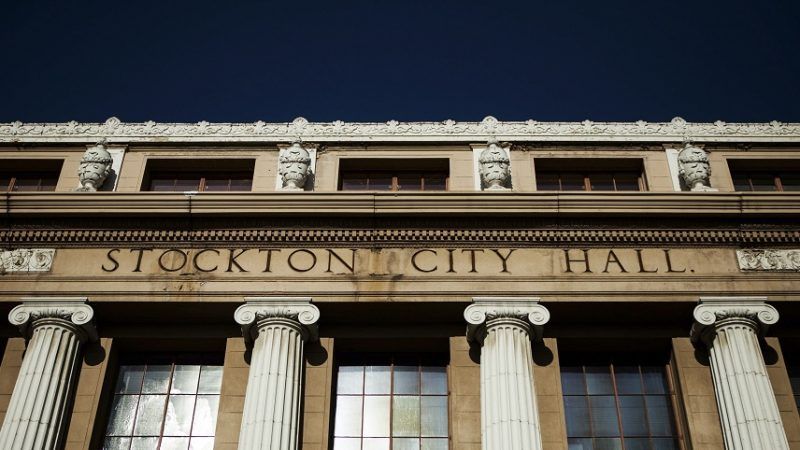Stockton's 'Basic Income' Plan Diverts City From Its Real Duties
The city wants to spend a grant it got giving residents $500 a month for two years.

There's a simple solution to the nation's poverty and inequality problems, an acquaintance told me several years ago. He suggested that the federal government simply give $1 million to every citizen and, voila, we'd all be rich and happy. After some quick math (323 million x $1 million = more trillions than even the U.S. Treasury can print), he realized that he didn't add enough zeroes to his cost calculation. Turning the United States into Zimbabwe, where a $1 trillion note won't even buy a soda, isn't much of an idea.
But while the above thought experiment is zany, a number of politicians and economists are proposing a similar idea—but on a much more modest scale. In fact, one of California's most impoverished cities, Stockton, is working on a proposal that would provide a "Universal Basic Income" to a small number of residents. Instead of a million bucks, the city—thanks to a grant from some Bay Area tech entrepreneurs—wants to hand out $500 a month for two years without any limits on how it's spent.
It's not as controversial as Stockton Mayor Michael Tubbs' proposal last summer "that pays people not to commit crimes," as KCRA reported. But now Tubbs is back with this latest "let's just pay people" plan. The income idea is backed by a group that believes "cash is an effective way" to rebuild the American middle class. It's a pilot project that will help evaluate how this type of program works.
Tubbs makes some good points about the poor way in which his city traditionally has been trying to boost middle-class jobs and incomes. "We've overspent on things like arenas and marinas and things of that sort to try to lure in tourism and dollars that way," he told KQED News. But bad ideas shouldn't be replaced with worse ones.
I own a bungalow in Stockton and know the city well. Indeed, Stockton officials have been models for doing things the wrong way. Over the years, they've dumped redevelopment subsidies in fancy downtown projects, which remain surrounded by run-down neighborhoods and blocks of largely vacant buildings. The city also spent lavishly on compensation for city workers, which helped drive it into bankruptcy.
In general, the universal income concept is designed to replace current assistance programs. It's been touted by leftists, but even free-market economist Milton Friedman supported the concept as a means to reduce bureaucracy and end the "welfare trap." Current programs phase out as people get jobs, and the goal is to incentivize work. You can receive your payment and still work.
But analysts are downplaying crucial points. For starters, there's little chance direct payments would replace existing programs. It's like other ideas that might appeal to some people on a philosophical level. Some libertarians like a mileage-based road tax rather than the gasoline tax because it would charge people based on how much they use the freeway system. The political reality is we'd end up with a mileage tax and the gas tax.
Government does not often shutter its bureaucracies. The same holds true for these universal income proposals. Furthermore, it's foolhardy for individual cities to embrace these programs, especially since it eventually will involve oodles of public funds. Stockton's budget is crumbling under the weight of misguided past financial decisions. It can't even provide a decent level of public services as is—let alone after it starts handing out payments to people. And incentives matter. If the city subsidizes its residents, then Stockton will become a magnet for people who most want such subsidies.
Realistically, 500 bucks a month isn't much to live on anywhere in California. If this idea takes hold, it will be followed by demands to increase the payments. I can envision the "Living Wage Coalition" that would rise up to demand more money from City Hall, the legislature or Congress. It's dangerous to make larger swaths of people dependent on the political process to secure their living. This already is the case to some degree, but this idea will make it far worse.
But my biggest fear is what it will do to the already eroded concept of work. Many people prefer to do nothing if someone else will pay their bills. "A UBI would redefine the relationship between individuals, families, communities, and the state by giving government the role of provider," wrote Oren Cass in a National Review article last year. "It would make work optional and render self-reliance moot." It's one thing to provide a safety net and another to reward sloth.
Stockton should focus on the basics. If officials keep their budget in order, rein in compensation packages for city employees and provide first-rate services and a friendly business climate, it could lure the jobs that are the key to a middle-class lifestyle. Giving away "free" money—whether it's a million bucks or 500—is a terrible idea.
This column first appeared in the Orange County Register.


Show Comments (65)